Almost all small businesses use social media for brand building and increasing conversions. When developing their social strategies, businesses will choose from a wide variety of platforms, tools, and metrics. Companies should consider trending social media topics and operational needs when determining their social strategies.
Small businesses believe that social media is the best digital marketing channel for meeting their targeted objectives.
If small businesses want to connect with consumers genuinely in their daily lives, it only makes sense to turn to social media. Almost 4 billion people use social media and users have doubled since 2015.
Social media facilitates connections globally, allowing small businesses to appeal to a target market. With the help of an advertising agency, small businesses can get social media posts in front of the right audiences in a targeted manner. Some companies can even go viral on social platforms with unique, compelling content.
These possibilities level the playing field for small businesses hoping to compete against larger, more established brands.
Because social media marketing trends are constantly changing, small businesses must strategically plan how they allocate their time and resources around various platforms to keep up with the latest trends.
Visual Objects surveyed 500 small business owners to determine which social media topics and trends for businesses should keep in mind when planning for 2021.
Our Findings
- Eight in ten small businesses (81%) plan to invest in social media in 2021, emphasizing the importance of social media marketing.
- Most small businesses (74%) engage at least weekly on social accounts, encouraging an active and consistent posting schedule.
- More than three-quarters of small businesses (78%) use Facebook, making it the most popular social media marketing platform.
- Only 14% of small businesses use TikTok, despite its ability to reach wide audiences.
- About half of small businesses (48%) plan to use YouTube more in 2021, encouraged by increased usage by key demographics.
- Small businesses (30%) consider engagement metrics the most important measure of success on social media, despite their inability to directly inform changes in revenue.
- Only 31% of small businesses use software to manage their social media activity, even though they save time and resources.
Almost All Small Businesses Invest In Social Media
Social media is part of the majority of small business marketing strategies.
Eight in ten small businesses (81%) intend to invest in social media in 2021.
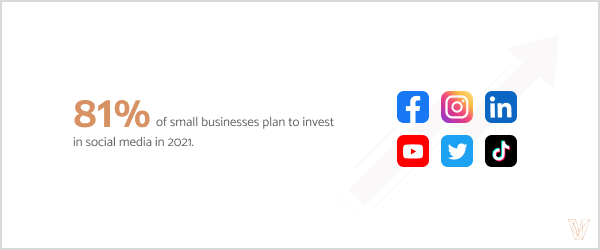
Active social media profiles contribute to brand awareness, increased customer engagement, and even increased conversions.
Jo Barmes, the founder of Your Lifestyle Businesses blog, works to encourage and enable entrepreneurs to grow their businesses. Barnes recommends engaging on social media to establish a values-based connection with customers.
“People aren’t just interested in the best product anymore, they want to know what a brand stands for,” Barnes said. “Social media is the perfect medium for brands to laser-target an audience whose values align with their own.”
"Social media is the perfect medium for brands to laser-target an audience whose values align with their own."
Most small businesses use social media as a means of making meaningful connections with their target audience.
Most Small Businesses Engage With Followers At Least Weekly
Companies that use social media tend to post, share, or interact with followers at least once each week to maintain an active social media presence.
Three-quarters of small businesses (74%) are active on their social media accounts at least once each week.
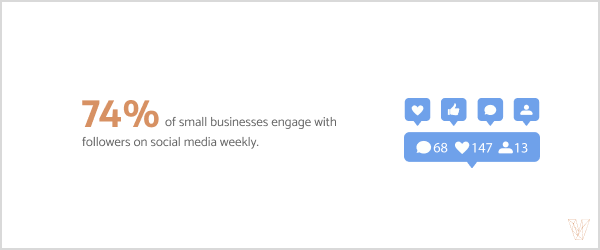
Regularly updating social media platforms with new content keeps consumers up to date with business offerings and draws in business from new customers.
Founder of travel blog kevmrc.com, Kevin Mercier, uses social media regularly to market his business. Mercier finds that frequent social media activity is important to hold customers’ attention but warns against posting too much.
“The frequency of posting is important whether you're posting on your blog or on your business's social media account,” Mercier said. “Too little may lead to disinterest while posting too frequently can bombard viewers and lead to a decline in engagement.”
Mercier recommends posting to Facebook once per day or Instagram twice per day for optimal engagement results.
Small businesses generally interact with their followers on a weekly basis to engage them with their brand.
Active Companies Project Increased Revenue
When small businesses keep up an active social media presence, they’re more likely to boost their revenue.
While COVID has made revenue generation a challenge, 56% of companies that engage with social media at least once per week project revenue growth in 2021.
During the COVID-19 pandemic, social media marketing became an especially valuable way to connect with customers digitally.
Lockdowns and brick-and-mortar closures reinforced the need for businesses to adapt to virtual selling environments to sustain increased revenue during unforeseen circumstances.
Small businesses that are active on social media are more likely to expect increased revenue in 2021.
Facebook Is Most Popular Platform For Small Businesses
Small businesses flock to Facebook to promote their businesses more than any other social media platform.
Currently, 78% of small businesses use Facebook, making it the most popular social media platform.
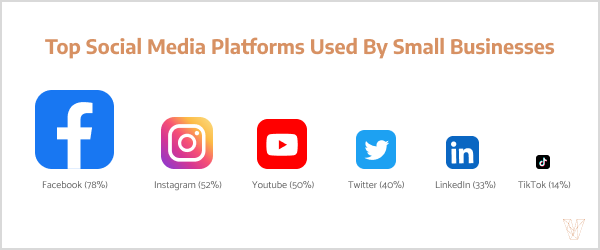
Facebook continues to beat out other popular apps such as Instagram (52%) and YouTube (50%) for small business marketing.
While Facebook reaches billions of consumers around the world, many small businesses are most concerned about connecting with local customers. Freelance marketing consultant, Steve James, also highlights Facebook marketing’s localized reach.
“'Real people have learned to use Facebook in many more ways: groups of subsets of the local population, hobby groups, political commentary,” James said. “The more that you can access as a local, the more people you will reach where they live.”
Marketers stay active on Facebook because it allows small businesses to reach local, niche audiences directly.
Facebook Still Offers The Widest Reach
Facebook maintains popularity with small businesses because the platform effectively helps them meet their business objectives.
Currently, 25% of small businesses value reaching a wide audience over all other benefits, which is greater than any other motivation for using social media.
Facebook has the most active users of all social media platforms, a title it’s held for years, making it the perfect place to reach a wide variety of people.
Miles Beckler, consultant and entrepreneur, affirms that Facebook is the most popular social media marketing platform because marketers think it can help them cast a wide net.
“As a small business owner, it's in your best interests to reach as many of the right people as possible,” Beckler said. “Facebook has the greatest potential for engagements and impressions.”
"Facebook has the greatest potential for engagements and impressions."
While other platforms may appeal to niches that better represent your target audience, Facebook marketing continues to have the widest reach.
TikTok Has Yet To Gain Traction With Small Businesses
TikTok surged in popularity since its 2016 launch, especially with younger generations. Small business marketers have been slower to adopt the platform than young users.
Currently, only 14% of small businesses have adopted TikTok.
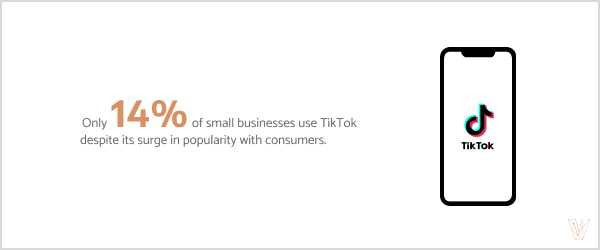
Despite being a relatively new social media platform, TikTok already has over 1 billion users.
While TikTok has dramatically increased in popularity with consumers, small businesses have been hesitant to try the app.
Robin Barendsen, a marketing specialist for debt factoring company Factris BV, believes TikTok has the potential to reach large volumes of consumers in certain markets.
“TikTok can be a gold mine for the right business,” Barendsen said. “It’s incredibly easy to get a huge reach because it’s so popular.”
"TikTok can be a gold mine for the right business."
However, Barendsen also reminds businesses that TikTok is most popular with younger audiences. These demographics may have less disposable income, so high engagement rates may not lead to a proportional number of conversions.
Small businesses remain skeptical about the benefits of marketing on TikTok.
Companies Plan To Increase YouTube Activity In 2021
While small businesses still hesitate to do video marketing on TikTok, many intend on investing more in YouTube activity in 2021.
Almost half of small businesses (48%) intend to increase their YouTube activity in the next year.
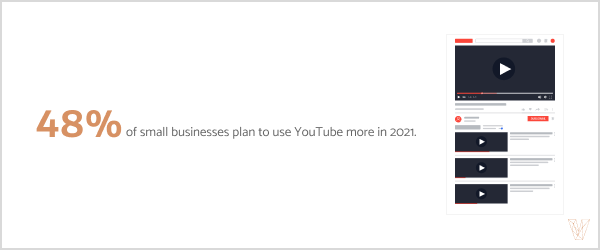
Small businesses are able to connect with a broad audience through engaging video content on the platform, which is likely a driving force for increased use.
YouTube is also starting to catch on with older demographics such as Generation X and Baby Boomers.
These generations are typically more challenging to reach on social media. Their designation as major growth demographics on YouTube makes them uniquely attractive to marketers, especially because members of these generations typically have more disposable income than their younger counterparts.
John Stevenson, a marketing specialist at My Gre Exam Preparation, recommends YouTube as a reliable, safe social platform for brands to market themselves.
“Youtube is the new television,” Stevenson said. “There's a large stream of revenue with the platform, which makes it viable and sustainable should the pandemic hit back again.”
"Youtube is the new television."
Consumers can expect more video marketing content from small businesses on YouTube in 2021.
Small Businesses Value Audience Engagement Metrics
Small businesses primarily measure their social media marketing success through audience engagement metrics such as likes, comments, or shares.
About a third of small businesses (30%) find engagement metrics most important for measuring the success of social media efforts, the most popular method of tracking achievement.
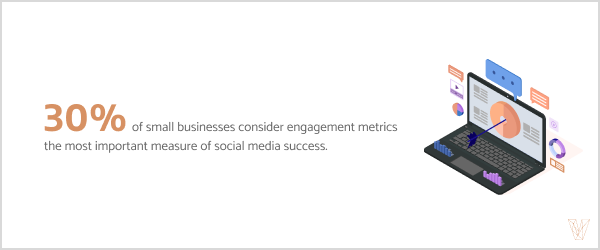
Engagement metrics inform companies of exactly how many people are attracted and interested in their content. This can offer helpful insights into whether certain campaigns are effectively reaching the intended audience.
However, experts argue that engagement metrics aren’t necessarily the most important. Meg Marrs, founder of dog training platform K9 of Mine, believes small businesses should be most focused on their bottom line when selecting which metrics to focus on.
“Ultimately, there are a lot of vanity metrics out there,” Marrs said. “When it comes down to it, the most important metrics to track are driven conversions, revenue, and traffic. Everything else is just static.”
"When it comes down to it, the most important metrics to track are driven conversions, revenue, and traffic. Everything else is just static."
Marrs encourages small businesses to keep their eyes on revenue rather than engagement metrics to determine whether social media marketing efforts are converting customers.
Many small businesses will be looking to engagement metrics to benchmark the success of their social media activity.
Social Media Software Is Rare For Small Businesses
Despite social media’s popularity among small businesses, it’s not common for companies to use software to manage their activity.
Less than one in three small businesses (31%) use social media management software such as Hootsuite to facilitate social media activity.
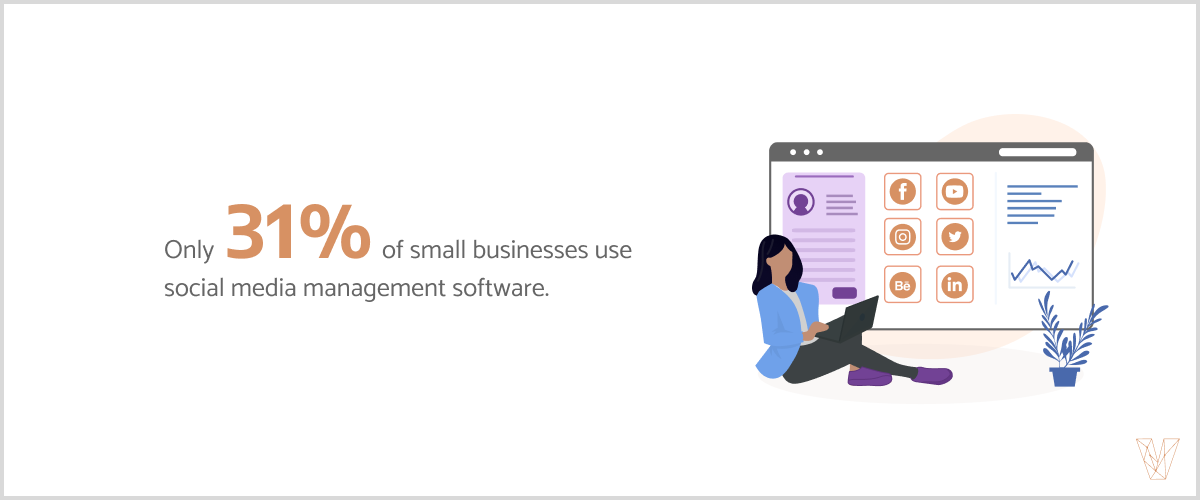
Companies can manage, analyze, and interpret social media engagement across accounts using social media management software.
Jenson Heaton, the founder of travel blog Nomadic Inscriptions, uses Hootsuite to schedule and manage activity across social media platforms.
“I love Hootsuite. I swear by it,” Heaton said. “Any company should start using [social media management systems] when posting to individual social media platforms starts to take up too much of their time.”
Heaton assures small businesses that their time management capabilities will benefit from adopting social media management software.
Social Media Topics Inform Small Business Strategy
Small businesses use social media topics and trends to direct their digital marketing strategies, and digital marketing agencies can help with this step.
Practically all small businesses currently invest in social media. Companies will allocate resources based on these prevailing trends:
- Most small businesses keep an active posting schedule, interacting at least weekly with followers.
- Facebook is the most popular social media marketing platform for small businesses.
- Few small businesses have adopted TikTok, but the platform could be effective for companies targeting younger consumers.
- More companies plan to increase investment in YouTube than other platforms because of its wide-reaching popularity.
- Small businesses place the most value in engagement metrics when evaluating social media success.
- Few small businesses use social media management software to facilitate posts and metrics analysis.
Small business social media activity and strategy will influence broader social media topics and trends.
About the Survey
Visual Objects surveyed 500 small business owners and managers at companies in the U.S. with fewer than 500 employees in December 2020.
Fifty-three percent (53%) of respondents are female; 47% are male.
Twenty-six percent (26%) are 18 to 34; 50% are 35 to 54; 24% are 55 or over.
Seven percent (7%) of respondents’ businesses have 1 employee; 36% have 2 to 10
Respondents are from the South (35%), Northeast (23%), West (22%), and Midwest (20%).